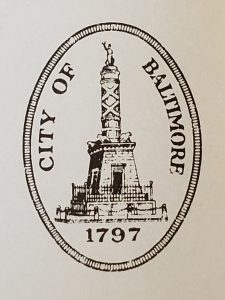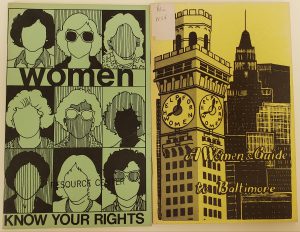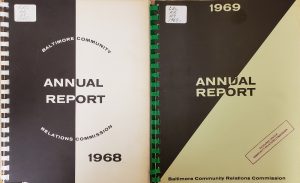The Special Collections & Archives have been busy this past summer working to preserve and make accessible archival collections and digital resources. We are happy to announce that the Baltimore City Office of Civil Rights Records, a recently processed collection, is open and available for research!

Students and researchers interested in learning about the history and workings of Baltimore City offices and government will find this collection particularly interesting.
The Baltimore City Office of Civil Rights and Wage Enforcement is the city agency responsible for enforcing the federal and local civil rights laws and wage laws. The Office of Civil Rights and Wage Enforcement consists of three commissions and one board: the Community Relations Commission, the Mayor’s Commission on Disabilities, the Wage Commission, and the Civilian Review Board.
The collection at the UB Special Collections & Archives contains materials from the former library and resource center of the Baltimore Office of Civil Rights and the bulk of the collection documents the work of the Community Relations Commission, an agency within the Office of Civil Rights.
The Community Relations Commission was founded in 1956 and originally named the Equal Opportunity Commission. It enforces fair employment practice and human rights in the city. The Commission is responsible for fighting discrimination in employment, public spaces, housing, education, and health and welfare services.

In addition to organizational files, pamphlets and publications, annual reports, and other materials that document various Commission initiatives and work over the years, the collection also documents Commission events and people. Some significant topics included in this collection include employment, discrimination, housing, the city’s response to civil disorder in 1968, mediation resources, population decline issues in the city during the 1970s, and the city’s Race Relations Summit in 1990 during Kurt L. Schmoke’s tenure as mayor of Baltimore.
The Race Relations Summit in 1990 was thoroughly planned by the Community Relations Commission and both the planning and assessment of the event are well documented in the archival collection. You can read one 1990 Baltimore Sun article about the event online here and check out the folder list in the Community Relations Commission Race Relations Summit, 1990-1991 series of the archival collection to learn more.
The annual reports located in the Community Relations Commission Pamphlets, Reports, and Publications, 1963-1993 series of the collection provide an interesting window into the work of the Community Relations Commission and into different points of Baltimore’s history.

For example, the Baltimore Community Relations Commission 1968 Annual Report discusses the events in Baltimore City after the assassination of Dr. Martin Luther King, Jr. in a section titled, “The Rebellion.” A short excerpt from the 1968 Annual Report can be read here:
“The most significant event of 1968 for the City of Baltimore was the four-day rebellion which came in the aftermath of the assassination of Dr. Martin Luther King.”
(Baltimore Community Relations Commission 1968 Annual Report, p. 1, Baltimore City Office of Civil Rights Records, Special Collections & Archives, University of Baltimore).
This section of the Annual Report also discusses events and community responses leading up to, during, and after the four-day period in April 1968. It also reflects on the media response and the actions of the City and the Federal Government during the events.The analysis and insight regarding the work of the Commission throughout the year in the 1968 Annual Report make it a valuable resource for researchers studying this era of Baltimore’s history.
Throughout this collection, students and researchers interested in city government, Baltimore City history, race relations in Baltimore, urban policy, and social issues will find this collection particularly useful. Researchers will also find related resources on the Baltimore City Office of Civil Rights and Wage Enforcement at the Baltimore City Archives.
If you would like to view and/or use the Baltimore City Office of Civil Rights Records archival collection for yourself, please contact the Special Collections & Archives to set up an appointment!